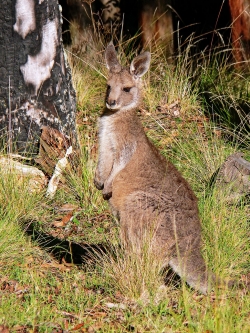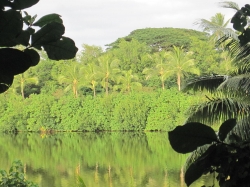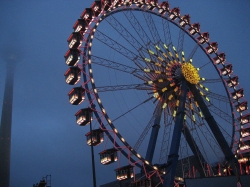It's snowing outside, and we are stuck inside with nothing to do. Let's call our friend in Australia. Ring, ring, ring. "'Allo?" "Hey! How's the weather down there?" "Ah, it's beautiful, mate! Sun is shining. And we're about to go out and see the kangaroos!" What? How can it be so cold in North America while it is sunny and warm down there? Is it always that nice in Australia? Should we move there right now? Not so fast.

OK everybody, let's hop to it.
Benjamint444, CC BY-SA 3.0 , via Wikimedia Commons
You know that the weather outside will change depending on the sun. When it's high in the sky, all the snow will melt and it can be very nice out. When it's low on the horizon, it can get pretty cold. The sun doesn't hit every part of the Earth the same way. To see how this works, let's pretend your head is the Earth. The top of your head is the North Pole and the bottom of your chin is the South Pole. Let's turn on a lamp that dangles in the very center of the room. What part of your head gets the most light? The middle, right? The
equator is an imaginary line that wraps around the center of the Earth. This line on your head would touch your nose and wrap around your ears to the back of your head. This is the place on Earth (and your head) that gets the most sun or light. That's why places like Hawaii are nice all year long. There is no winter. There is no summer. Just. . .ahhhhh.

Hawaii, paradise on the equator.
Joel Bradshaw, Public domain, via Wikimedia Commons
Are your eyes starting to hurt? Go ahead and turn around. Now you will not be able to see the light. Make slow turns while standing in one place. Let's say North America is where your eyes are. Every time you see the light, it's daytime there. Every time you do not see light, it's night.
Rotation means to turn. Every time the Earth makes one full turn, that's one day. I hope you do not feel dizzy, because that is not the only movement the Earth makes.
While you are spinning in a circle, I also need you to walk in a circle around the light. The Earth also moves in a big oval around our sun.
Orbit means to move around something else. Every time you make one turn around the light, that is the same as one year. Yes, it goes pretty slow. Oh, did you crash into the wall? The Earth never does that. There's a ton of space out there between us and anything we could run into.

On a ferris wheel; each seat spins or rotates around where it is held to the wheel while it also orbits the center of the wheel. Kind of confusing.
Gorkaazk, CC0, via Wikimedia Commons
If North America is on your eyes, then Australia will be right above the back of your neck. But wait, isn't it getting the same amount of light as your eyes? How was it so sunny and warm down there when we called out friend? Here is where it gets tricky. Nod your head forward so your chin is close to your chest. As you spin in one place while walking in a circle, you will notice that sometimes your eyes will get a lot of light and sometimes they will not get much. When your eyes don't get the light, it's on the back of your neck. An
axis is an invisible line that something spins around. If we spin a top on the ground, it will spin straight up, but Earth is different. Earth's axis leans to one side. That's why the Australians get to go see the kangaroos outside while you sit inside and try to stay warm.
You can stop spinning. The sun hits different parts of the Earth at different times of the year. Sometimes it's because one part is faced away, because it's spinning in place. Other times it's because it has moved away as it moves in a big oval around the sun. The reason we have seasons is that the Earth sits on an axis, so some places will lean into the sun when others are leaned away. Right now, Australia is the lucky one that's getting all the sunshine. Just be glad the Earth never gets queasy like you. We do not want it to stop spinning.
References: Kidport. "The Planet Earth" Kidport, 2010. <
http://www.kidport.com/reflib/science/space/Earth.htm>
Science Kids. "Earth, Sun & Moon" Science Kids, 2009. <
http://www.sciencekids.co.nz/gamesactivities/earthsunmoon.html>